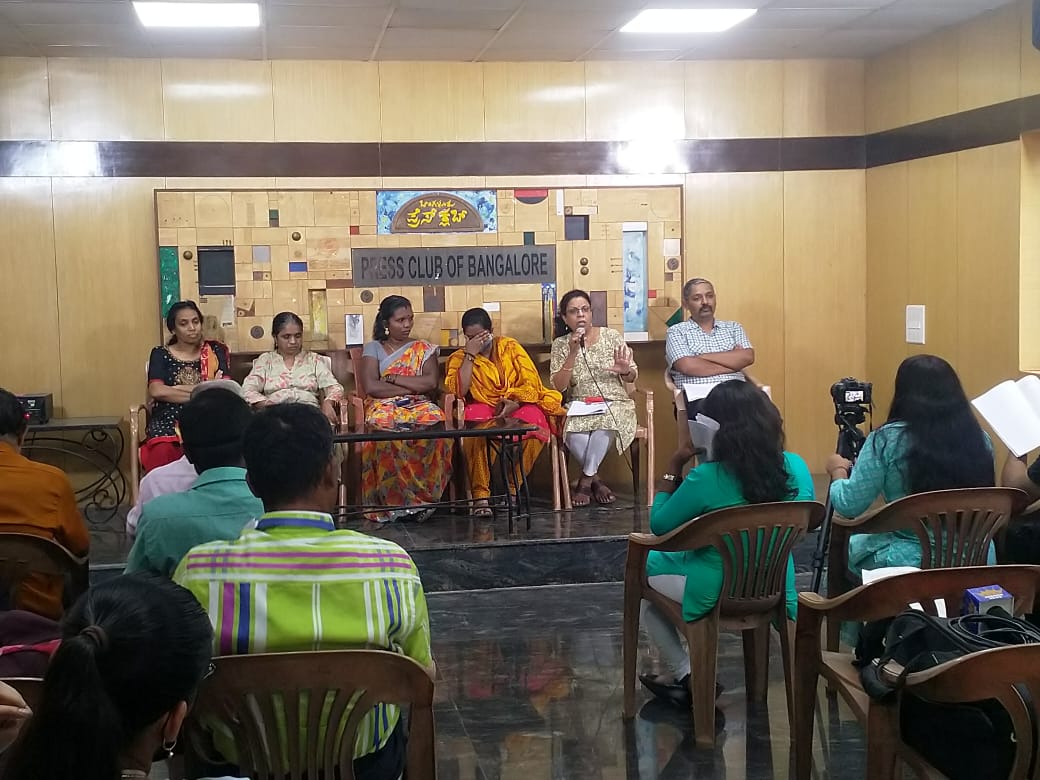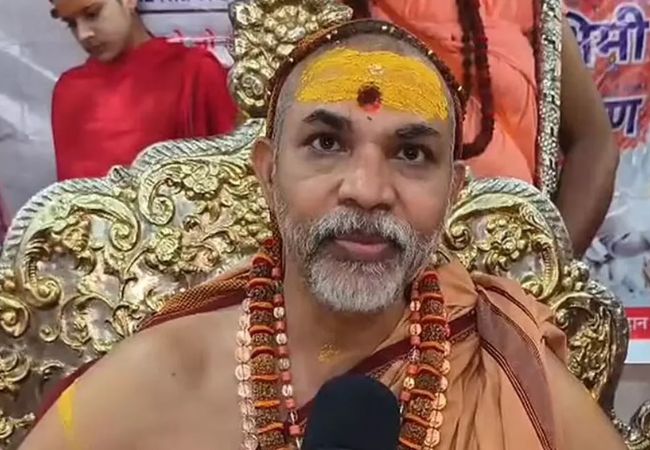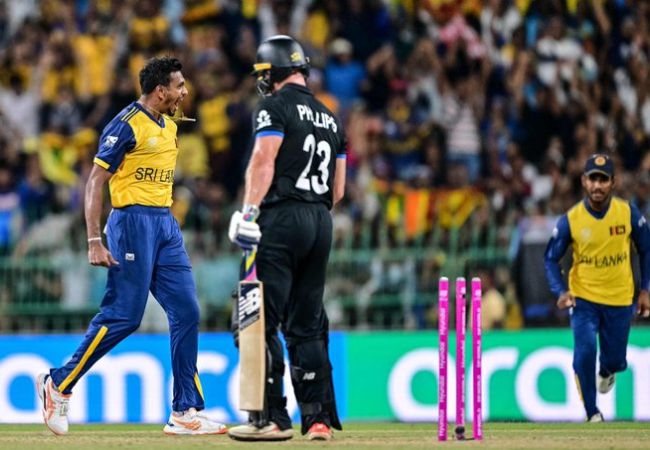Bengaluru: Action Aid Association and Slum Mahila Sanghatene on Tuesday released a study report on the impact of COVID on children’s education. A public hearing in this regard was held on March 22 following which the jury released a report on Tuesday here at the Press Club Bangalore.
COVID has had a terrible impact on every aspect of life. Loss of loved ones, lost livelihood prospects for historically marginalized groups, increased child maltreatment, loss of learning due to school shut down for 20 months, increased child marriage, child trafficking, and child malnutrition are amongst the difficulties that vulnerable communities experienced. The devastating consequences for the nutrition, health, and education of hundreds of thousands of children, increase in child labor, early marriages, domestic violence, as well as the absence of structured learning opportunities which have caused severe academic regression, can be termed as an Education Emergency, the report added.
Roughly 230 million additional individuals are now below the minimum wage poverty line, primarily due to economic shocks. The current economic crisis is harming children's education, the report quoted 'State of Working India, 2021– One Year of Covid-19,' a study conducted by Azim Premji University.
“Action Aid and Slum Mahila Sanghatane conducted a public hearing on the impact of Covid-19 on Children's Education on the 22nd of March in Bangalore. The public hearing was to amplify the experiences and demands of children and their families. Both the organisations compiled 64 case studies from 5 districts of the state and some of the families had the opportunity to make their case at the public hearing. 14 aggrieved children and their distressed families shared several concerns and challenges in accessing education during and post the pandemic while struggling to survive,” a joint press statement from Action Aid and Slum Mahila Sanghatane stated.
They were responded to by Mr. Narasimhaiah, Director, Primary Education, Education Commission, Government of Karnataka, Mr. Devaraj, Joint Director, Social Welfare Department, Government of Karnataka, and Dr. Anjum Hafiz, General Manager of Karnataka Minority Corporation.
The deposition by children and their families as well as the State response was heard by a jury composed of Ms. Kavita Ratna - Director - Advocacy, The Concerned Working for Children; Mr. Gurumurthy Kasinathan - Director IT for Change and member of the National Coalition on the Education Emergency, and Adv. Vinay. K Sreenivasa - Alternative Law Forum, Bangalore. Based on the hearing, this report has been prepared by them.
Observations and Key issues:
Overarching issues:
- Parents are in great distress for not being able to ensure good education for their children. Several of them, while describing the ordeals and struggle they are presently facing to get their children educated, broke down during the hearing.
- Children have been out of school for 2 whole years now due to the pandemic. In the case of flood-affected districts of North Karnataka, students have been out of school for four years now.
- Students are unsure of when they will rejoin, for a variety of reasons - economic hardships making fee payment impossible, child labor, early marriages.
- Children’s mental health is being affected because they have been at home for so long without any learning or other engagements. They are also likely to be sharing the overall stress of the family during these traumatic times.
- In the rural areas (Bagalkot, Kodagu for example) children are dropping off from school and taking up jobs in brick kilns, plantations, and other occupations. The damage/loss/harm/deprivation is far worse in the case of children from Dalit and Muslim families.
- Vulnerable children, like those who have lost both parents or one parent, have left school in significant numbers.
- Preventing Muslim girls from pursuing education, on grounds of traditions relating to their clothing, is creating exclusions, leading to further inequities in education.
- Children and parents are being humiliated by private school teachers and management for non-payment of fees.
- Due to long school closure, children have become less ready for schooling and also cannot be taught at their ‘grade-level’ based on their age.
- Schools run by the Tribal department offer poor quality education, as their academic infrastructure and preparation is inadequate.
- Due to continuous migration over the years, the number of children in rural areas may be declining or increasing much more slowly, and student enrollment may be reducing. However, in urban areas, especially Bengaluru, for the same reasons, the number of students is increasing. Also, due to the inability to pay fees, students are migrating to government schools and some schools are overcrowded.
- Online education was not useful at all. Access to devices and connectivity was very poor. Even students who could connect were unable to learn from online classes.
- Due to long school closure, children have become less ready for schooling and also cannot be taught at their ‘grade-level’ based on their age.
- Dalit students have not been getting scholarships/fees reimbursements.
- In some high schools, there are no lady teachers, this makes it difficult for adolescent girls to raise issues they face.
Bangalore and other Urban settings
- Most parents from Bangalore have enrolled their children in private schools, either because they chose English as the medium of instruction or could not find government-run schools that teach in their mother tongue (Tamil, Telugu, and Urdu etc.). Pre-COVID, they had managed to pay the fees for these schools.
- During and post COVID, parents are unable to pay the fees as their economic situation has worsened due to the loss of jobs, underemployment, wage cuts. Where possible, they have taken loans with heavy interests to pay the fees for 2019-2020.
- During the time of school closure, some of the schools have provided ad hoc online education, which has not reached and/or benefited these children in any meaningful way.
- Post-COVID 3rd wave, on reopening, private schools are now refusing to let children get back to classes or take exams without all the dues being met. Parents are unsure if their children have passed or failed, as their schools have withheld this information until the pending fees are paid. (Under the RTE Act, children cannot be detained until class 9, so this ‘failure’ should have no impact on their progress, but parents may be unaware of this)
- Among them, some parents have been struggling to get the Transfer Certificates from the schools - but that too is being denied until dues are settled. The schools demand arrears of the last two years (2019-20 and 2020-21) in addition to the current year (2021-22), which can amount to even 80,000 to lakh of rupees per child, in some cases. Parents are unaware that they can take the help of the local BEO to make the HM issue the TC. Also, some parents reported that the BEO was not helpful in this matter.
- Many families who have migrated from other states (Tamil Nadu, Andhra Pradesh, and Telangana) face the serious problem of not being able to switch to a government school as their children are not familiar with the Kannada medium. Government schools do not teach in English medium, so students enrolled in private schools in English medium find it difficult to transition from private to government schools. This becomes more difficult in older age groups (starting with middle school).
Recommendations:
Child-specific recommendations, where appropriate, were provided at the hearing. They have not been listed here, as they are not likely to be relevant out of context. The recommendations below are in response to the concerns noted at the hearing, as well as the concerns we are aware of in the course of our work and experiences. They also take into consideration recommendations of children’s and community groups in relation to their education and other rights.
There is a dire need for the state government to drastically increase the budgetary allocations to all the departments dealing with children - primary and secondary education, women and child welfare, higher education, social welfare, and tribal welfare, but the 2022 budgets have only marginal changes over the previous year. The government must also present the ‘Child budget’ along with the budget, to provide a fuller picture of investment in children of the state.
The government must conduct wide public hearings such as this in all districts, and the reports of the same must be collated. A special legislature session must be conducted to discuss the issues that have arisen and discuss remedial measures.
Understanding the extent and severity of the problem
- The RTE Act confers a fundamental right on children to be in school, hence every child MUST be in school. The government is duty-bound to ensure that each and every child is in school. An out-of-school children (OOSC) survey must be carried out speedily. This should be anchored by the Education Department in collaboration with the Departments of Social Welfare and Women and Child so that on the completion of the survey the children can be provided holistic and multipronged immediate as well as long term. Bringing ALL children into school
- Specific efforts must be made to ensure that children of marginalized communities are able to get back to school.
- Every BEO must ensure that any child who wants to move out of school receives TC and joins a school to continue their education.
- The government must conduct a mass information campaign to alert parents that they are entitled to collect TC of their children even if they have not paid the fees/fees arrears, education is a fundamental right of every child in the 6-14 age group and non-payment of fees or any other reason cannot affect the exercise of this right.
- This circular https://schooleducation.kar.nic.in/pdffiles/TC29112021.pdf (from https://schooleducation.kar.nic.in/html/circularsgen.html) which mandates private schools to issue TCs within 1 week of appeal by parents who wish to admit their children to government or aided schools. If the schools fail to comply, parents can approach the respective BEO who is required to send a notice to the Headmaster of the concerned school demanding action within 1 week. If the school still fails to issue the TC, action can be taken against the HM and the school management.
- Many students are at home, because their parents are unable to pay the fees to the private school where they studied in the English medium, and they are unable to adjust to the Kannada medium of instruction. The department must quickly address this issue as this will lead to large-scale dropout of children.
Working in school
- Teaching in every school MUST accommodate the fact that children have NOT been in school for most of two years. Children who are now in grade 5 did not attend most of grade 3 and 4. So directly teaching them grade 5 textbooks will be quite meaningless and will lead to drop out over time. Hence, teachers must be equipped and supported by the department to be supportive of children. The state should build the capacity of teachers to support children to catch up / the state should provide additional support such as additional classes to ensure all children in the class learn and make progress.
- Government must initiate a program to prepare teachers to transact in a way that enables all children in the classroom to learn. This implies pedagogical approaches that allow multilevel learning, as well as supporting teachers with multi-level learning resources
- Given that online education is not a solution. In the future, schools should be the LAST to be closed and the FIRST to be opened.
- The nutrition of children has taken a severe beating due to the pandemic impact on families. Government must significantly increase the investment in Akshara Dasoha and Ksheera Bhagya to provide supplementary nutritious food like eggs, vegetables, and fruits.
- As ordered in 2017, academic management of Government Ashram Schools have to be transferred to the Education Department on urgent footing. The Education Department will have to ensure that the programme will take into account the unique requirements of the students from Scheduled Tribes who form the majority.
- Child health check-up and counselling, covering both physical and mental health and wellbeing, must be organized across all schools in collaboration with the health department.
- Supplementary instructions/teaching must be planned for the next few years to support student learning in community centers (Samudaya Bhavan) with help of trained graduate and diploma holders in education (B.ED. and D.Ed qualified youth)
- Support additional resources such as books, workbooks, stationery, etc. must be provided to the student.
- Schools should be made available within the communities, by restarting the ‘Vidyagama’ program of the Government of Karnataka, to provide supplementary instruction that can facilitate their transition to schooling. More number of children will leave school completely and turn to work full time if they are not supported adequately with an education that is appropriate and adequate in their current contexts (i.e. equipped schools, supportive vocational training / appropriate extracurricular/midday meals)
- Government should provide free education and remedial coaching for children from poor families, from single-parent households, from distressed migrant communities, etc.
- Government must design programs to support children to continue education, including providing hostel facilities for those from migrant communities, as well as those who have lost homes during covid (either physical homes or both parents are deceased, and they have no caregivers), scholarships and fee waiver and support for all other school-related costs. This should include both children accessing private, government-aided, and government schools. Assessments of the need for support could be undertaken on a case to case basis
- Government must design initiatives such as psycho-social counseling and could enlist the expertise of CSO and NGOs working for child rights and child protection.
- A special program for bringing back children from marginalized groups, girls into school and providing empathetic education must be launched.
- The government must consciously open new government schools - elementary and secondary in areas not served, with adequate physical and academic infrastructure and teachers, and not abdicate this responsibility to private schools (the fee payment crisis is a clear indication of relying on private schools - private schools cannot ensure universal and equitable access). Government must use available information on population and school availability in different areas/wards and plan school opening wherever required in a phased manner, on priority
- Tamil Nadu has initiated programs specifically to address the issues arising from the pandemic, such as Illam Thedi Kalvi (community support to learning) and Ennum Ezhutum (Foundational literacy and numeracy), similar programs are required here as well.
Let the Truth be known. If you read VB and like VB, please be a VB Supporter and Help us deliver the Truth to one and all.
Lucknow (PTI): The Uttar Pradesh Congress on Wednesday staged a statewide protest demanding a fair and transparent inquiry into the FIR lodged against Swami Avimukteshwaranand Saraswati and those who filed the complaint against him.
In a statement issued here, the party said memorandums addressed to Prime Minister Narendra Modi were submitted through district magistrates in all districts of the state.
Uttar Pradesh Congress spokesperson Manish Hindvi told PTI that the memorandums were handed over through the district administration in all 75 districts.
In the memorandum, the party alleged that Saraswati and his disciples were "unnecessarily harassed and humiliated" by police on the occasion of Amavasya and were prevented from taking a ritual bath (at the Magh Mela). It further alleged that some disciples were manhandled and taken to a police station.
The memorandum also claimed that an FIR was later registered against Saraswati, his disciple Swami Mukundanand Brahmachari and several unidentified persons in a sexual harassment case. It termed the case a "conspiracy" aimed at tarnishing the seer's reputation.
Citing Articles 25 and 26 of the Constitution, the memorandum stated that these provisions guarantee religious freedom and the right of religious denominations to manage their own affairs.
It described the position of shankaracharya held by Saraswati as "one of the highest spiritual posts in Sanatan tradition" and alleged that the entire episode appeared to have been "orchestrated in a planned manner".
"We request that the background of the persons who got the FIR registered be investigated in a transparent manner by a retired high court judge and strict action be taken against them," the memorandum said.
It also sought a "fair and transparent probe" into the allegations levelled against Saraswati so that the truth could be established.
Earlier, Uttar Pradesh Congress president Ajay Rai had told reporters in Varanasi after meeting Saraswati that the party stood firmly with him.
The Congress said it would continue to press for an impartial inquiry into the entire episode.
On February 21, an FIR was lodged in Prayagraj against Saraswati and his disciple Mukundanand Brahmachari on charges of sexually abusing two persons, including a minor, over the past year at a gurukul and religious congregations, including the recently concluded Magh Mela.
Days after he was booked, Saraswati had said on Monday that he would not oppose his arrest and asserted that the "fabricated story" would be exposed sooner or later.
At a press conference on Wednesday, Saraswati alleged that criminals rule in Uttar Pradesh, level allegations and influence investigations, as he denied having any contact with the two persons for whose alleged sexual abuse he has been booked.



_vb_77.jpeg)
_vb_00.jpeg)
